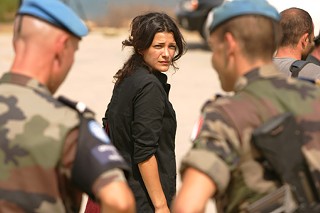Great Escapes
AFS Essential Cinema: Children of Abraham/Ibrahim 3
By Josh Rosenblatt, Fri., Feb. 13, 2009
Let's take a look at life in the Middle East and North Africa over the past 15 years as the nightly news likes to portray it. Intifadas in Palestine, bombings in Israel, war in Iraq, economic upheaval in Jordan, political assassinations in Lebanon, religious insurgencies in Saudi Arabia, American raids all over. Add to that the extreme heat, and it's no wonder so many movies coming out of the region focus so heavily on the idea of escape.
Every year the Austin Film Society, as part of its ongoing Essential Cinema series, sets aside six weeks in February and March to present little-seen films from this troubled part of the world. Surprisingly, for the past two years, Children of Abraham/Ibrahim: Films of the Middle East & North Africa has largely steered clear of movies that are overtly political or too heavily focused on the violence that is constantly threatening to break out there. Instead, series curator Chale Nafus has chosen to focus on the small slice-of-life experiences we in the U.S. rarely bother to think those living in Iraq or Bahrain or Jordan actually live through.
This year, however, Nafus and the AFS are tossing caution out the window and screening films that pit humanity squarely against the torments of human history. The program kicks off with the Austin premiere of director Deepa Mehta's 1998 drama, Earth, a story of friendship and betrayal set in 1947, the year India gained its independence from Great Britain and was partitioned into Hindu-dominated India in the West and Muslim-dominated Pakistan in the East. With this division came enormous cultural turmoil and economic chaos, not to mention inevitable tribalism and bloodshed. Taking as her canvas one of the most enormous political and cultural shake-ups of the century, Mehta glides back and forth between the inner world and the outer to show the effects great sociopolitical moments have on the lives of powerless individuals – in this case, an 8-year-old girl named Lenny who sees a close friendship get swallowed by age-old prejudices and the indifferent tide of history.
Those seismic events of 1947 haunt Pakistani mother Ayesha in Khamosh Pani: Silent Waters. Written and directed by Sabiha Sumar and released in 2003, Silent Waters is a sobering look at the horrors that befall societies when they give in to the temptations of fanatical theocracy. Only a girl at the time of Pakistan's establishment (a girl haunted, in gritty black-and-white flashbacks, by the religious purges and riots of that time, which sent Sikhs running to India and Muslims running to Pakistan by the millions), Ayesha is, by the time of the events of the film, a middle-aged mother living in a small village with her teenage son, Saleem, during the 1979 rise of Gen. Muhammad Zia-ul-Haq, the radical Islamic president who incited a new age of religious fanaticism in Pakistan. Bored, poor, and given to daydreaming, Saleem is the perfect target for the bands of zealots that stalk the streets of his hometown threatening nonbelievers, browbeating shop owners, terrifying women, and recruiting ... always recruiting. A powerful story about the battle between ideology and humanity, Silent Waters is most fascinating for its portrayal of the thousand and one personal and historical pressures – both large and minuscule – that can add up to a life of zealotry, pressures we here in the West would probably be wise to take note of.
As February turns to March, the series turns its attention to the never-ending battle for Jerusalem with Close to Home (Karov la Bahit), about two 18-year-old Israeli girls trying to balance their personal inclinations with the responsibilities of military life. If nothing else, Close to Home is a testament to the triumph of human desire – for sex, for clothing, for beauty – in the face of grave geopolitical circumstances. The series then takes a break from the concerns of a politicized Middle East with Bab'Aziz: The Prince Who Contemplated His Soul, a curious, confusing, celebratory fairy-tale fantasia about a blind old dervish telling tales of love and religion to his young granddaughter as they wander the desert. Cut from the same cloth as The Canterbury Tales and 1,001 Nights, only with much more dancing, Bab'Aziz is a reprieve, a jolt of optimism in a series bathed in despondency, or at least skepticism.
That reprieve continues (sort of) the following week with Ali Zaoua: Prince of the Streets, a movie about destitute orphans in Casablanca who see their friend Ali get killed by a rival gang and take it upon themselves to bury his body. Like Slumdog Millionaire, only without the big budget and Oscar nominations, Ali Zaoua is a modern-day tale of Dickensian privation set against the backdrop of a bubbling Islamic metropolis. The film's hero, Kwita, is one of the millions of preadolescent victims of globalization currently prowling the earth looking for something resembling meaning or perhaps just a warm meal, and whenever possible, Kwita indulges himself in animated dream sequences whose simplicity and guilelessness belie the cynicism of his real life. Kwita knows that life isn't worth anything, of course, but like so many others in the world – like so many others in this series – he takes solace in fantasy. Whether that fantasy comes in the form of cartoon imaginings, fairy-tale escapism, or religious fanaticism, the temptation is always the same: the chance to take refuge from a society that wasn't made for you and that is always looking for new ways to grind you into sand and scatter you to the desert winds.
The program closes on a somber, if hopeful, note with Philippe Aractingi's Under the Bombs, a tale of unconventional and ultimately impossible friendship flowering in the rubble of war-torn Southern Lebanon in 2006. Surrounded by death and antagonism, a Shiite woman and a Christian taxi driver seek out their own sense of escape in each other. In a long-battered world, fantasy doesn't have to be fantastical; it only needs to provide a way out.
All screenings take place Tuesdays at 7pm at the Alamo Drafthouse South Lamar. Admission is free for Austin Film Society members, $4 for general public. For more information, visit www.austinfilm.org.
Children of Abraham/Ibrahim 3: Films of the Middle East & North Africa
Feb. 17: Earth
Feb. 24: Khamosh Pani: Silent Waters
March 3: Close to Home (Karov la Bahit)
March 10: Bab'Aziz: The Prince Who Contemplated His Soul
March 24: Ali Zaoua: Prince of the Streets
March 31: Under the Bombs (Sous les Bombes)











